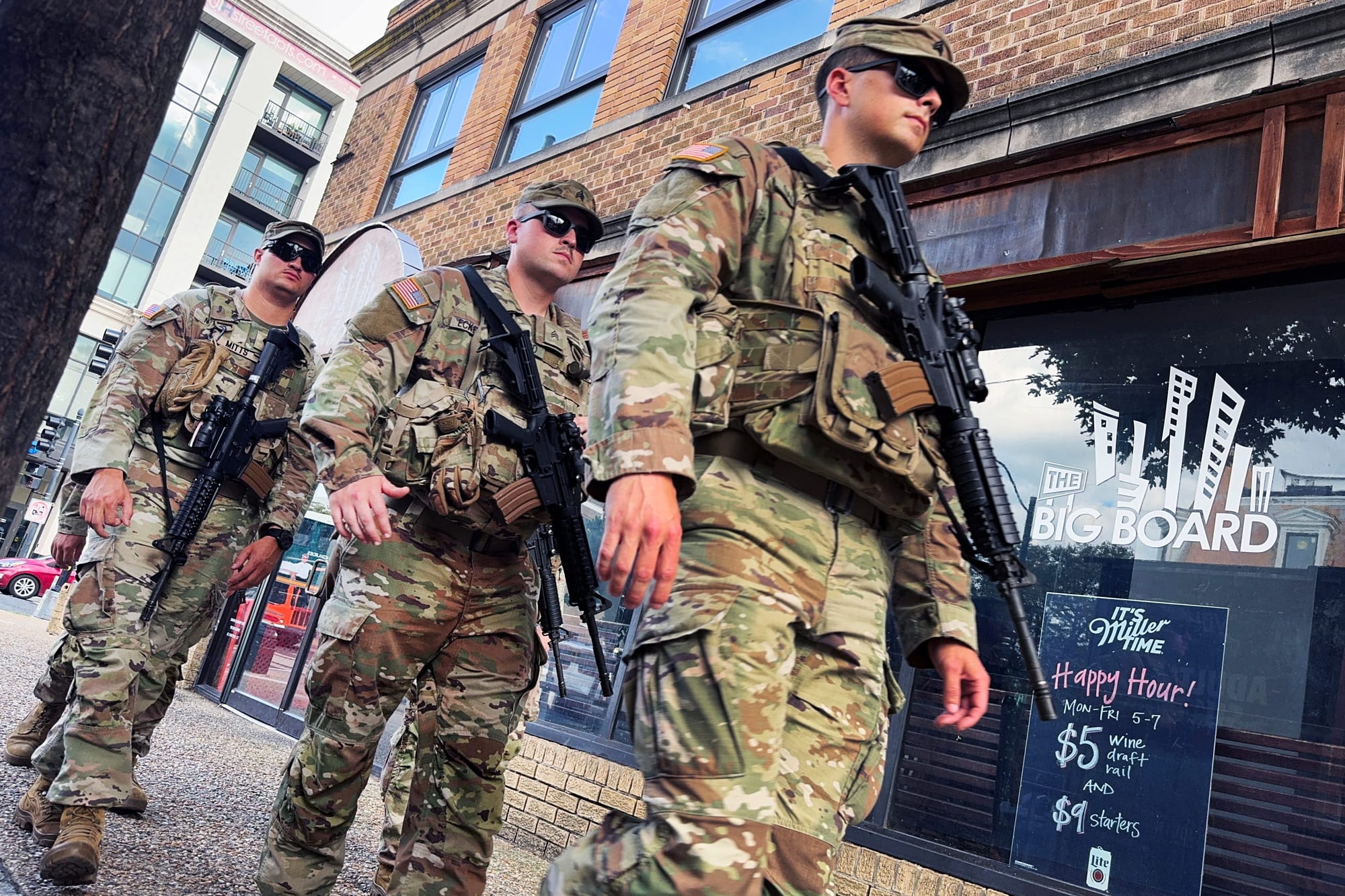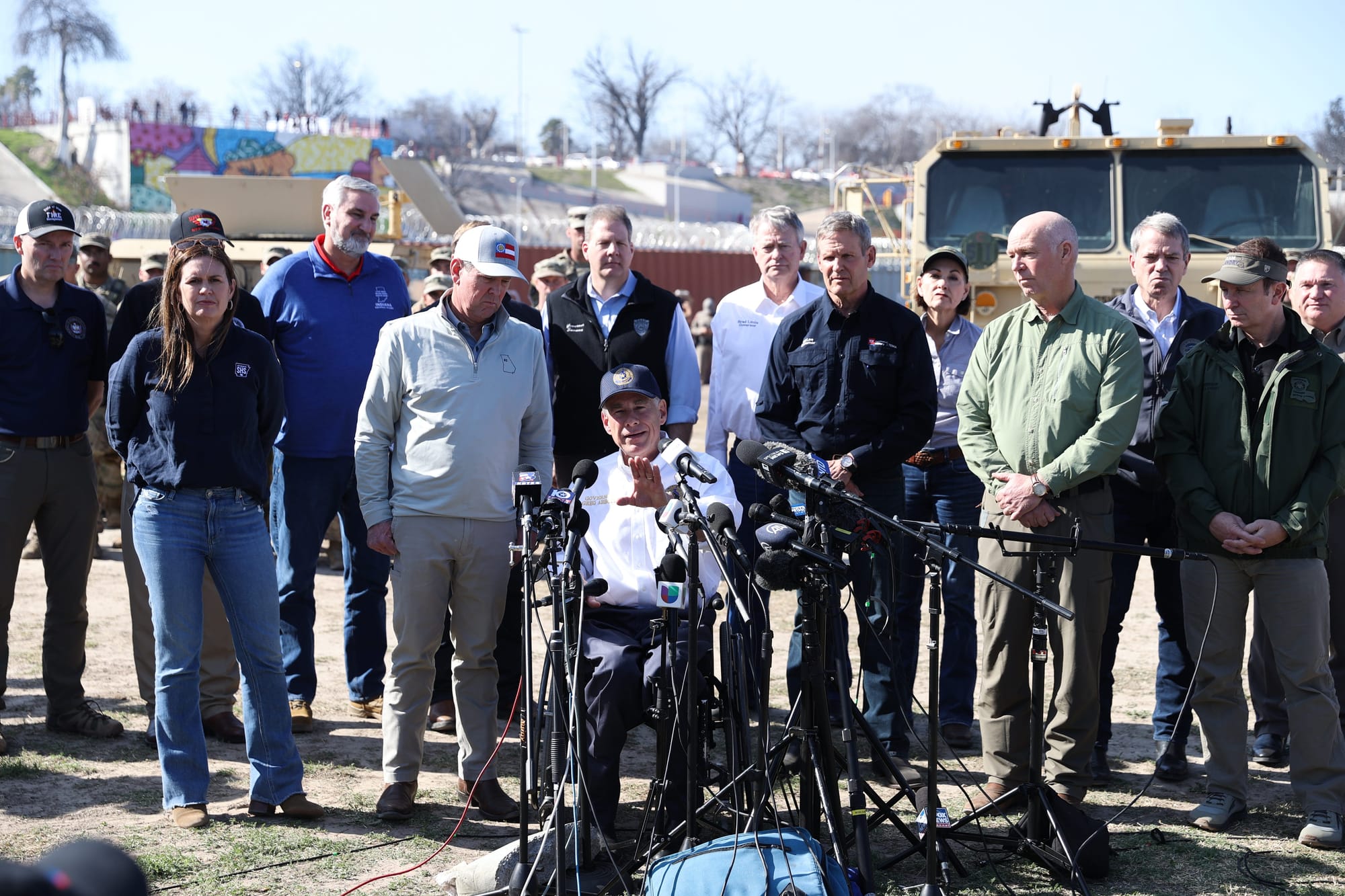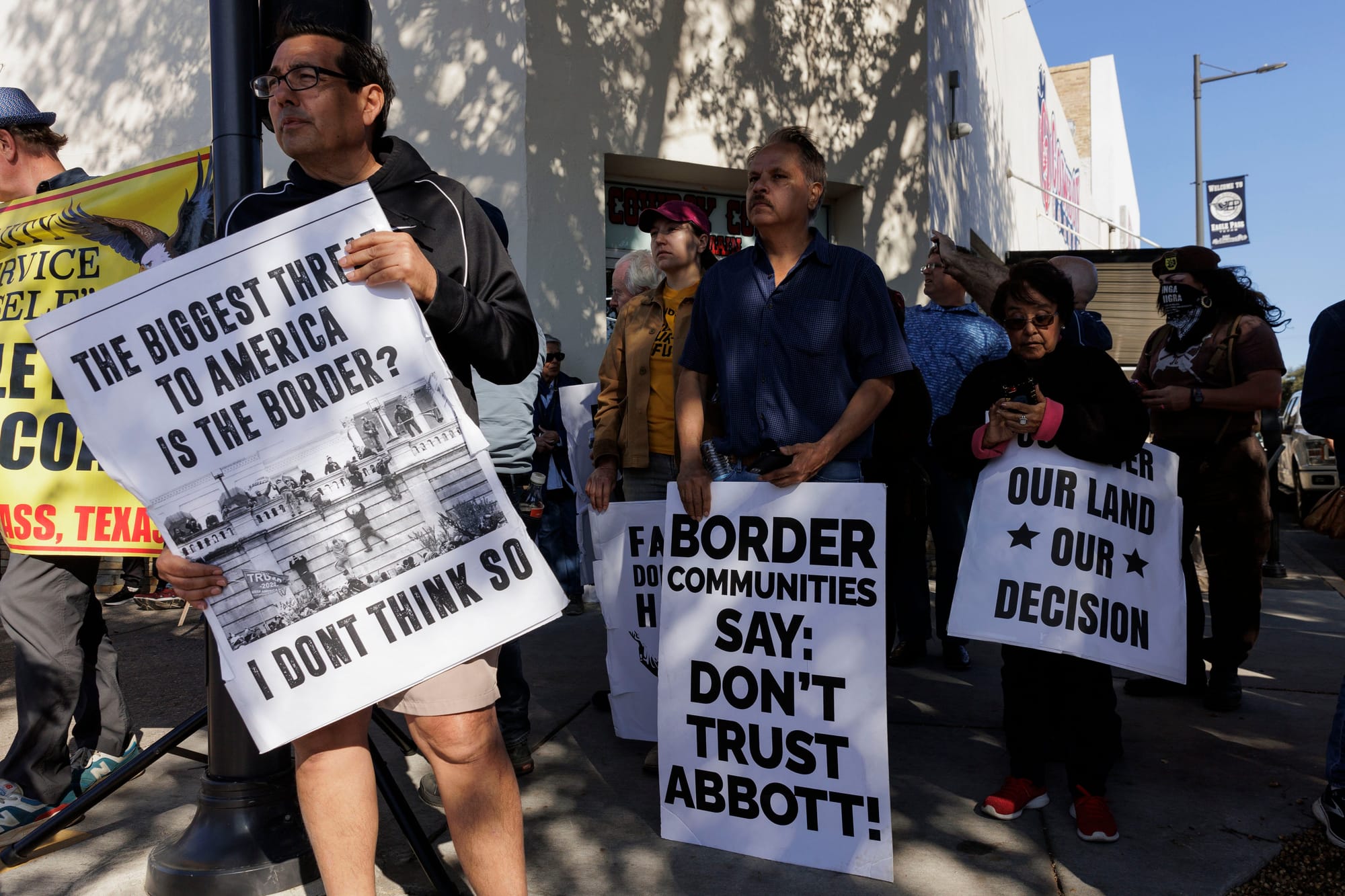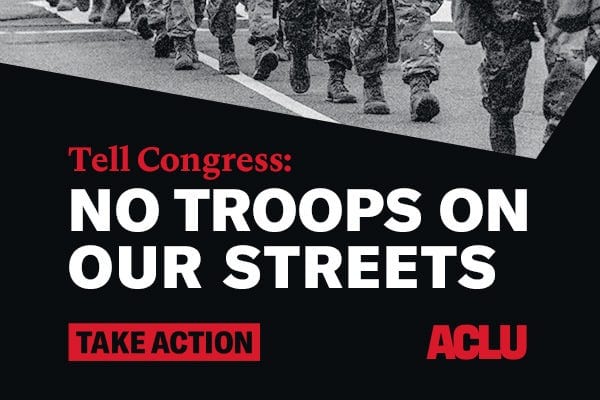The Border Chronicle Weekly Roundup: February 13
How exactly do we get out of this apocalypse? The artists might just know. And why we need to be concerned about how U.S. military tactics abroad find their way home.
How the Republican-led Operation Lone Star in Texas became Trump’s model for sending troops into Democratic-led cities.

On September 15, President Donald Trump directed the National Guard and federal agents to deploy to Memphis, a majority-Black city run by a Democratic mayor.
The plan was endorsed by Tennessee governor Bill Lee and Senators Marsha Blackburn and Bill Hagerty, all Republicans and Trump allies. Mayor Justin Young, however, rejected the plan. “I did not ask for the National Guard,” Young said, “and I don’t think it’s the way to drive down crime, but that decision has been made.”
Trump’s deployment of troops to U.S. cities run by his political opponents has struck many as extraordinary and unconstitutional. But it’s a familiar move to Texas border residents, whose communities have been occupied by National Guard troops deployed by Republican-led states, including Tennessee, since 2021.
The Texas-Mexico border is majority Latino and leans Democratic in a state governed by Republicans. Since Texas governor Greg Abbott’s Operation Lone Star launched in March 2021, Abbott and other MAGA-aligned governors have spent billions of taxpayer dollars to send troops and police to the border. Residents have faced racial profiling, and migrants arrested on criminal charges have been held in state-run jails with little oversight or transparency. Meanwhile, the national media have portrayed border communities as dangerous, even though FBI crime statistics show they are among the safest in the country.
While much of the country is unaware of Operation Lone Star, it has served as a testing ground for Trump’s mass-deportation campaign and for his troop deployments. Since 2021 troops and police from MAGA-led states have trained together on the Texas border, sharing intelligence and developing procedures to address “border crime.” Recently, six of these states deployed troops to Washington, DC, even though their own cities have higher crime rates than the nation’s capital.

According to military experts, both constitutional norms and the limits of interstate compacts have been undermined by Operation Lone Star and Trump’s troop deployments. Meanwhile, Texas border residents have had to learn hard lessons about protecting their communities. These lessons, they say, could help other Democratic-led cities like Memphis as they confront Trump’s militarization.
Two years ago, Eagle Pass, a small border city in Texas, became the center of the MAGA occupation. The city’s municipal park was seized by the governor in 2024, fenced off, and guarded by armed National Guard soldiers. MAGA allies, including Elon Musk, Tom Homan, and Tennessee governor Bill Lee, as well as Trump himself, visited Eagle Pass and held press conferences at Shelby Park, which was transformed into a de facto military installation. Leading up to the presidential election, they used this opportunity to promote the racist “great replacement” theory, claiming that President Joe Biden and the Democrats were inviting migrants into the country to replace White voters, and that the country was under invasion. This narrative, they argued, justified military force to counter the so-called invasion. The invasion rhetoric helped normalize military deployments in U.S. communities, and it convinced Americans that the United States is under threat.
“We were a learning lab,” said Amerika Garcia-Grewal, an Eagle Pass resident and cofounder of Frontera Federation, a border-wide advocacy organization. She expressed frustration over how her town became a national talking point in right-wing media, while mainstream media failed to challenge the MAGA talking points. “The Dr. Phil show called me,” Garcia-Grewal said, “and asked me to be a guest talking about child trafficking. I told them that isn’t an issue in Eagle Pass, and so they didn’t want me on the show,” she said, adding, “There are these fear-based narratives, they’re not real, but they’re picked up and propagated. Fear it gets clicks on YouTube, and it sells ads, and it puts more money into the pockets of corporations. It was just incredibly frustrating that we were not able to get past that fear-based narrative in the national media, and we weren’t able to talk about what our real needs are, like running out of water in South Texas.”
Garcia-Grewal said her advice to cities like Memphis is to focus on community needs, “and not what the right-wing social media machine is telling you.” She added, “Don’t be distracted. Don’t give in to the fear. This is not really about security. They are taking millions from taxpayers for actual things that keep communities safe, like education, community centers, and health care, and handing it to private corporations, law enforcement, and the military.”

Since 2021, Texas has spent more than $11 billion on occupying border communities and arresting and jailing migrants. This has created an entrenched economy and constituency. In a state with the nation’s 11th-highest poverty level, funds for health and human services, juvenile justice, and the electrical grid have been redirected to law enforcement and military deployments. Money has also gone to building walls, laying down miles of razor wire, and floating buoy barriers in the Rio Grande. Some of the state’s most impoverished communities are at the border, and to receive Operation Lone Star funding, city and county leaders must sign disaster and invasion declarations, thereby endorsing the militarization of their communities.
Roberto Lopez, who grew up in the Rio Grande Valley, said that when Operation Lone Star started, the changes “came so fast, and so quick.” Now a senior advocacy manager for the nonprofit Texas Civil Rights Project, Lopez said, “It felt like every other month there was something new—a disaster declaration, an invasion declaration. It sowed so much fear.”
At the same time, it has enriched a portion of the population, incentivizing the border’s continued militarization. “I have relatives who are in ICE, who are in Border Patrol, because it’s a good-paying job, and there aren’t many of those at the border,” he said. “The overtime pay from Operation Lone Star means that you have access to wealth and upward mobility that just isn’t available in other fields.”
Local restaurants and hotels also benefit from the deployments. City and county leaders have used Operation Lone Star funding to fill spending gaps. A recent analysis by The Houston Chronicle found that millions in OLS money, with little oversight, have been spent on items like tricked-out trucks, a medical examiner’s office, and plugging county budget deficits. “This makes people deeply invested in telling a narrative that heavy-handed violence is the only way to approach the border,” Lopez said.
Since Operation Lone Star launched, it has lacked both an end date and a clearly defined metric for success. Investigations by ProPublica and others have found that many arrests and drug seizures—cited by the governor and state leaders to bolster OLS numbers—came from cities with no connection to the border. Yet none of these reports have had an impact on the Texas Legislature. Even though border crossings have greatly declined since mid-2024, legislators recently designated another $3.4 billion for the military initiative, and in early September, Abbott was reportedly ready to send the Texas National Guard to Chicago.
Similarly, Trump’s budget, which transfers billions from safety net programs like Medicaid to law enforcement and the military, will create an economy centered around the militarization of U.S. communities, while services that make communities healthier and safer will disappear.
As the Trump administration expands the world’s largest detention system, Americans will be forced to fight for their civil and constitutional rights or risk losing them, said Lopez and Garcia-Grewal. “Document everything you can,” Lopez said. “Take pictures, take videos, and know what to do and say if law enforcement gets angry. Because racial profiling is going to skyrocket. Harassment and horrible interactions are going to skyrocket. Community is everything. Because when we go into the streets, go to trainings, and build relationships, it means that we are stronger and can protect ourselves.”
After Operation Lone Star occupied Shelby Park, Garcia-Grewal noted that she and other residents had to continually demand access to the park for their border vigil event, a monthly prayer meeting acknowledging migrant deaths. “The soldiers kept telling us that they were keeping us out for our own safety,” she said. “And I would tell them, ‘I don’t understand how you are protecting me by taking away my constitutional right to worship freely.’” After some pushback, the soldiers started letting them in. “If we had not asserted that we had a constitutional right to worship freely, they would have kept us out. It was just us saying repeatedly, ‘You can’t have these rights. I am actively using them.’ Because if we don’t, power is going to take every single bit that it possibly can.”

In 2021, Abbott gave National Guard soldiers a few days to arrange their personal affairs before deploying to the border under Operation Lone Star. Typically, the guard responds to natural disasters for short stints. If they are called overseas, the federal government allows them several months to make arrangements before they leave on extended duty.
Initially, soldiers were informed that their deployment would last a year. Owing to the hasty mobilization and poor planning, soldiers reported, state pay was inconsistent or absent, and their purpose at the border was unclear. Many did not know when they could return to their jobs and families, leading to lost businesses and broken marriages. What was supposed to be a yearlong mission has now extended to more than four years. At least 17 soldiers have died while deployed under Operation Lone Star, including two in vehicle accidents, two from accidental shootings, and seven from suicide.
As Trump expands the Operation Lone Star model nationally, the National Guard is at a “flex point in history where future historians are going to be talking about this moment,” said military historian Andrew Wiest, founding director of the Dale Center for the Study of War and Society at the University of Southern Mississippi. “The guard is one of the most complex institutions in the country. And now we’re in a situation where I’d hesitate to guess how many Supreme Court cases there are going to be on this,” he said, referring to Trump’s deployments to Los Angeles; Washington, DC; and now Memphis and Portland, Oregon.
Wiest compared the situation to that of the 1960s, when southern governors used the state guard to enforce segregation and the “president in turn federalized them to do the exact opposite.”
Even then, the state guard largely operated within its own borders. That changed in 2005 when Hurricane Katrina hit; at the time, many guard personnel were overseas fighting in “long, grinding” wars in Iraq and Afghanistan, Wiest said. “The Mississippi guard was gone, so we relied heavily on units from other states to help us out.”
States began forming Emergency Management Assistance Compacts (EMACs) to allow soldiers from other states to assist during natural disasters, according to retired lieutenant colonel Paul Lyon, executive director of the Dale Center for the Study of War and Society. “Until Katrina, we had never really used the guard in that manner from other states,” he said.
The guard is now being asked to cross state lines to fight crime or enforce immigration laws indefinitely. In 2022, Abbott and Arizona’s then-governor, Doug Ducey, formed the American Governor Border Strike Force, signing a memorandum of understanding among 26 Republican-led states to share intelligence and coordinate operations. These states sent troops and police to the Texas border under Operation Lone Star and announced a “multistate law enforcement operation,” reportedly “seizing drugs, firearms, and ammunition.”
Three years later, mission creep is evident, as the focus shifts from “border crime” to policing abortion and gender-affirming care for trans people across state lines. Many states in the “border strike force” have outlawed abortion and gender-affirming care. Texas is further pushing boundaries by instituting travel bans for women and trans people seeking services out of state and attempting to arrest those who do, reminiscent of pre–Civil War slave states pursuing enslaved people across state lines.
Wiest and Lyon noted that it is legal for the National Guard, under state control or Title 32, to enforce laws. “But now the question is, can you send troops under Title 32 to a state that does not want them?” Lyon said.
Federally mobilized troops, under Title 10, like those Trump sent to Los Angeles, cannot engage in domestic law enforcement under the Posse Comitatus Act. After California leaders contested Trump’s occupation in court, a federal judge ruled it unlawful.
This may explain why Trump has backed down from sending troops to Chicago, where the Democratic governor has also threatened a lawsuit. On Saturday, however, Trump announced he would send troops to “war-ravaged Portland,” Oregon, another Democratic-run state, a move that will be challenged in court, as it was in California.
To continue with its occupations, the Trump administration has come up with a workaround, one that it has used in Texas border communities: find a Republican governor, like Tennessee’s, who will approve sending troops to a Democratic-run city.
Even before Operation Lone Star, the Texas border region faced years of performative “surges” and border security operations. Former police officer Eric Gamino, who grew up in the Rio Grande Valley, participated in one such operation and said he felt like a “performer in a dog and pony show.” It was “political theater,” he said. State leaders aimed to create “this imagery of lawlessness and chaos, and therefore the only institutional response was to militarize.” Gamino eventually left law enforcement and is now an associate professor of criminology and justice studies at California State University, Northridge. He recently witnessed Trump’s military deployment in Los Angeles and noted, “They’re taking a page out of the playbook that they used in the borderlands. We’re seeing the same political theater play out in the interior now.”
Several retired generals, in an amicus brief supporting California’s case, said the “deeply politicized” deployments harm morale and place troops in an “untenable situation.” Gamino empathized with the soldiers caught in the spectacle: “You’re putting on a performance of law and order for the public at large, but as an individual, you know it’s all for naught, because one, you shouldn’t be there, and two, you know it’s ineffective, in that there’s no need to put on that performance. But when you’re part of an institution of social control, you’re just a small cog in a finely tuned machine, and you have to decide to continue or get out. For my colleagues and I, we were doing it because it paid the bills. We had mortgages, we had school debt. And it’s the same thing with these soldiers.”

A sponsored message from the ACLU

President Trump’s deployment of military troops to American cities is a dramatic escalation meant to intimidate our communities and silence dissent. Using the military to police civilians at home undermines one of our nation’s most basic principles: the military should not be used to police the people it serves.
The ACLU is demanding immediate action to stop this abuse of power and protect our civil liberties. Congress must act now to halt the President’s misuse of military force domestically — and we need your support.
Take action by telling Congress to keep troops off our streets. Together, we can protect our communities.
Independent news, culture and context from the U.S.-Mexico border.